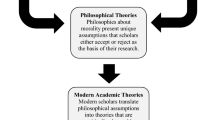Abstract
Two hundred and twenty-six state employees completed a structured questionnaire that investigated their ethical values and training needs. Top management were more likely to have attitudes against cronyism and giving advantage to others. Individuals higher in the organizational hierarchy, and female employees were more likely to believe that discriminatory practices were an ethical concern. In addition, employees with a larger number of clients outside of the organization were more supportive of the need to maintain strict confidentiality in business dealings. Employees' awareness and use of the organization's code of conduct generally proved to be poor predictors of ethical values. Other analyses revealed that a variety of sociodemographic factors, job characteristics and ethical values predicted specific areas of training needs in ethics.
Similar content being viewed by others
References
Brehm, J. N.: 1966,A Theory of Psychological Reactance (New York, Academic Press).
Callan, V. J., C. Gallois, P. Noller and Y. Kashima: 1991,Social Psychology (London, Harcourt Brace Jovanovich).
Carroll, A. B.: 1978, ‘Linking Business Ethics to Behavior in Organizations’,SAM Advanced Management Journal 43, 4–11.
Center for Business Ethics: 1986, ‘Are Corporations Institutionalizing Ethics?’,Journal of Business Ethics 5 85–91.
Clements, P. L.: 1988, ‘Ethics and Business Conduct Training’,Performance and Instruction 27, 6–10.
Forker, L. B.: 1990, ‘Purchasing Professionals in State Government: How Ethical Are They?’,Journal of Business Ethics 9, 903–911.
Fazio, R. H.: 1986, ‘How Do Attitudes Guide Behavior?’, in R. M. Sorrentino and E. T. Higgins (eds.).Handbook of Motivation and Cognition (Guilford Press, New York), pp. 204–43.
Gellerman, S. W.: 1989, ‘Managing Ethics from the Top Down’,Sloan Management Review 2, 73–79.
Harris, J. R.: 1990, ‘Ethical Values of Individuals at Different Levels in the Organizational Hierarchy of a Single Firm’,Journal of Business Ethics 9, 741–750.
Hodgkinson, C.: 1971, ‘Organizational Influence on Value Systems’,Educational Administration Quarterly 7, 46–55.
Kidwell, J. M., R. E. Stevens and A. L. Bethke: 1987, ‘Differences in Ethical Perceptions between Male and Female Managers’,Journal of Business Ethics 6, 489–493.
McClelland, D. C.: 1985,Human Motivation (Glenview IL, Scott Foresman).
McLagan, P.: 1989,Models for HRD Practice (Alexandria, VA, American Society for Training and Development).
Nielsen, R. P.: 1988, ‘Limitations of Ethical Reasoning as Action (Praxis) Strategy’,Journal of Business Ethics 7, 725–733.
Posner, B. Z. and W. H. Schmidt: 1984, ‘Values of the American Manager: An Update’,California Management Review 16, 202–216.
Rice, D. and C. Dreilinger: 1990, ‘Rights and Wrongs of Ethics Training’,Training and Development Journal May, 103–106.
Scase, R. and R. Goffee: 1990, ‘Women in Management: Towards a Research Agenda’,International Journal of Human Resource Management 1, 107–25.
Vitell, S. J. and T. A. Festervand: 1987, ‘Business Ethics: Conflicts, Practices and Beliefs of Industrial Executives’,Journal of Business Ethics 6, 111–122.
Watson, C.: 1988, ‘When a Woman is the Boss: Dilemmas in Taking Charge’,Group and Organizational Studies 13, 163–181.
Author information
Authors and Affiliations
Additional information
Victor J. Callan is Professor of Organizational Behavior in the Graduate School of Management at the University of Queensland. He is the author of 8 books and over 100 journal articles and book chapters in the areas of social and organizational psychology. His recent publications include a chapter in Marvin Dunnett'sHandbook of Industrial and Organizational Psychology (2nd ed., 1992), and a second edition ofSocial Psychology (Harcourt Brace Jovanovich, 1991).
Rights and permissions
About this article
Cite this article
Callan, V.J. Predicting ethical values and training needs in ethics. J Bus Ethics 11, 761–769 (1992). https://doi.org/10.1007/BF00872308
Issue Date:
DOI: https://doi.org/10.1007/BF00872308




